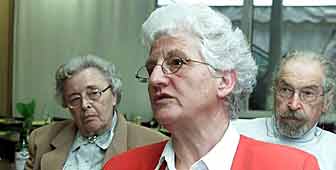Elderly battle to preserve political rights

Groups representing senior citizens are to challenge a cantonal decision which would prevent people of 70 and over from standing for political office.
Last week, canton Bern ruled that a decision by the community of Madiswil to fix an upper age limit of 70 did not contravene the Swiss constitution. In May, the local council in the community, which is home to just 1,800 people, voted in favour of introducing an age limit.
But Marie-Theresa Larcher, a spokeswoman for VASOS, an umbrella organisation for groups representing the elderly, told swissinfo the move was both anti-constitutional and discriminatory.
“It’s clearly stated in the constitution that no one may be discriminated against on the grounds of language, race, religion or age,” she said. “This decision is a clear case of discrimination against the elderly and contravenes the basic articles of the Swiss constitution.”
Discrimination
Larcher is also a member of the “Seniorenrat”, a commission set up by the government last year to monitor potential discrimination against the elderly and to investigate complaints and make recommendations.
On Monday, the Seniorenrat lodged a complaint with the Bern cantonal authorities. It criticised the office that had examined the legality of the Madiswil decision and demanded an official inquiry.
Andrea Greiner of the cantonal office responsible for assessing the legality of communal decisions (AGR) denied that the Madiswil vote had been anti-constitutional.
“The community simply wants to introduce an age limit for candidates to the local council,” she said. “There are plenty of other local authorities that have an upper age limit and even canton Bern itself has one for its executive committee – 65 years – and for cantonal commissions – 70.”
Greiner also rejects claims that introducing an age limit is discriminatory. She said the Madiswil decision provided clear guidelines. “Local authorities and commissions often have very heavy workloads and come under time pressure.
“People over 70 have to take more time off for illness, for example, and this has to be taken into account but it is not discriminatory. There is no denying that there are some 70-year-olds who are more than capable of carrying out political duties.”
Rights of the elderly
One such 70-year-old is Jacques Neirynck, an elected Christian Democrat member of the House of Representatives. He is appalled by the decision in Madiswil and also questions its constitutional validity.
But he also sees it as a more general attack on the rights of the elderly within Swiss society.
“For some people senior citizens are a nuisance because they don’t produce anything, they consume [and] they need pensions and health care,” he said. “Of course there is the temptation to suppress their rights and in particular their political rights.”
How far groups representing the elderly will get in their campaign to prove that the Madiswil vote was unconstitutional remains to be seen, especially as it is does not appear to be an isolated case.
The Seniorenrat’s cause is not helped by the lack of information about communal and cantonal age limits for political office across the country – a fact it is hoping to remedy over the coming year.
Widening the debate
Perhaps the most important contribution the discussion of the Madiswil decision has made is to stimulate public debate on the role and rights of the over-70s, which account for around ten per cent of the Swiss population.
“It has focused media attention on age discrimination in general,” Wolf Linder, the director of Bern University’s Institute of Politics, told swissinfo.
“Although it is not an attack on the voting rights of the elderly, we do have an ever increasing proportion of society which is older.
“The Madiswil decision will fuel debate on the role and rights of the elderly in general and the contribution they can make to society.”
by Jonathan Summerton

In compliance with the JTI standards
More: SWI swissinfo.ch certified by the Journalism Trust Initiative








You can find an overview of ongoing debates with our journalists here . Please join us!
If you want to start a conversation about a topic raised in this article or want to report factual errors, email us at english@swissinfo.ch.